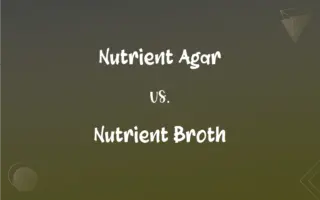Cognitive Science vs. Psychology: What's the Difference?
Edited by Harlon Moss || By Janet White || Published on December 28, 2023
Cognitive science is an interdisciplinary field studying the mind and its processes, while psychology focuses on behavior and mental processes from a more individual and clinical perspective.

Key Differences
Cognitive science is an interdisciplinary field combining psychology, neuroscience, linguistics, philosophy, and computer science to understand the mind and intelligence. Psychology is a broader discipline focused on understanding, predicting, and changing behavior and mental processes.
Cognitive science employs methods from various disciplines like experiments, computational models, and brain imaging. Psychology utilizes clinical studies, experiments, and psychotherapeutic methods.
Cognitive science research often focuses on areas like perception, language, memory, and artificial intelligence. Psychology covers a vast range of topics including development, social behavior, mental health, and cognitive processes.
Cognitive science integrates theories from multiple disciplines to understand mental processes. Psychology has its own set of theories primarily focused on human behavior and mental health.
The applications of cognitive science extend to AI development, human-computer interaction, and education. Psychology applies its findings in mental health treatment, organizational behavior, and personal development.
ADVERTISEMENT
Comparison Chart
Focus
Mind and its processes
Behavior and mental processes
Methodologies
Interdisciplinary, including AI and neuroscience
Clinical studies, psychotherapy
Research Areas
Perception, language, AI
Development, mental health, social behavior
Theoretical Basis
Multiple disciplines
Primarily psychological theories
Practical Applications
AI, human-computer interaction
Mental health, counseling, organizational behavior
ADVERTISEMENT
Cognitive Science and Psychology Definitions
Cognitive Science
Involves studying perception and memory.
His cognitive science project examines memory retention techniques.
Psychology
Explores social and developmental aspects.
Developmental psychology studies changes over a person’s lifespan.
Cognitive Science
Combines neuroscience, linguistics, and philosophy.
Cognitive science uses neuroscience to understand brain functions.
Psychology
Study of behavior and mental processes.
Psychology helps in understanding human emotions and actions.
Cognitive Science
Study of the mind and its processes.
Cognitive science researches how we learn languages.
Psychology
Involves therapy and mental health treatment.
She practices psychology, specializing in cognitive-behavioral therapy.
Cognitive Science
Focuses on understanding intelligence.
Cognitive science explores the nature of human and artificial intelligence.
Psychology
Uses experiments to understand human behavior.
Psychology experiments can reveal insights into decision-making.
Cognitive Science
Interdisciplinary field involving psychology and AI.
Cognitive science contributes to developing smarter AI systems.
Psychology
Applied in counseling and organizational settings.
Organizational psychology is key to improving workplace dynamics.
Psychology
The science that deals with mental processes and behavior.
Psychology
The emotional and behavioral characteristics of an individual, a group, or those engaged in a given activity
The psychology of war.
FAQs
What methods are used in cognitive science?
It uses interdisciplinary methods, including experiments and computational models.
How does cognitive science differ from psychology?
Cognitive science combines multiple disciplines for a broader view of the mind, while psychology primarily focuses on individual behavior and mental health.
What is cognitive science?
It's an interdisciplinary study of the mind and its processes.
What does psychology focus on?
Psychology focuses on human behavior and mental processes.
What methods are common in psychology?
Psychology uses clinical studies, experiments, and psychotherapeutic methods.
What are cognitive science's main research areas?
These include perception, language, memory, and artificial intelligence.
How is psychology applied in the real world?
It's applied in mental health treatment, counseling, and organizational behavior.
Can cognitive science inform AI development?
Yes, it plays a significant role in advancing artificial intelligence.
Can cognitive science help in education?
Yes, it contributes to understanding learning processes and educational techniques.
Does psychology involve counseling?
Yes, counseling is a significant part of psychological practice.
Can cognitive science explain human intelligence?
It aims to understand the nature and workings of human intelligence.
What disciplines contribute to cognitive science?
It includes psychology, neuroscience, linguistics, philosophy, and computer science.
Are cognitive science and psychology interrelated?
Yes, they overlap and inform each other in understanding the mind.
What is the role of psychology in mental health?
Psychology is crucial in diagnosing and treating mental health issues.
What are psychology's main research areas?
It includes development, mental health, social behavior, and cognitive processes.
Are psychologists involved in cognitive science research?
Yes, they contribute significantly to cognitive science studies.
Is psychology a part of cognitive science?
Yes, psychology is a key component of cognitive science.
What theoretical basis does cognitive science have?
It integrates theories from psychology, neuroscience, and other disciplines.
How does cognitive science impact technology?
It influences areas like human-computer interaction and machine learning.
How does psychology contribute to organizational success?
It helps in understanding and improving workplace behavior and dynamics.
About Author
Written by
Janet WhiteJanet White has been an esteemed writer and blogger for Difference Wiki. Holding a Master's degree in Science and Medical Journalism from the prestigious Boston University, she has consistently demonstrated her expertise and passion for her field. When she's not immersed in her work, Janet relishes her time exercising, delving into a good book, and cherishing moments with friends and family.
Edited by
Harlon MossHarlon is a seasoned quality moderator and accomplished content writer for Difference Wiki. An alumnus of the prestigious University of California, he earned his degree in Computer Science. Leveraging his academic background, Harlon brings a meticulous and informed perspective to his work, ensuring content accuracy and excellence.

































































